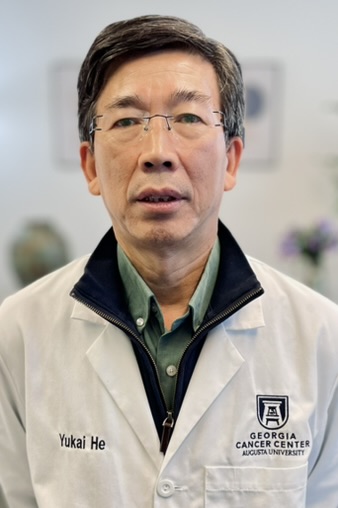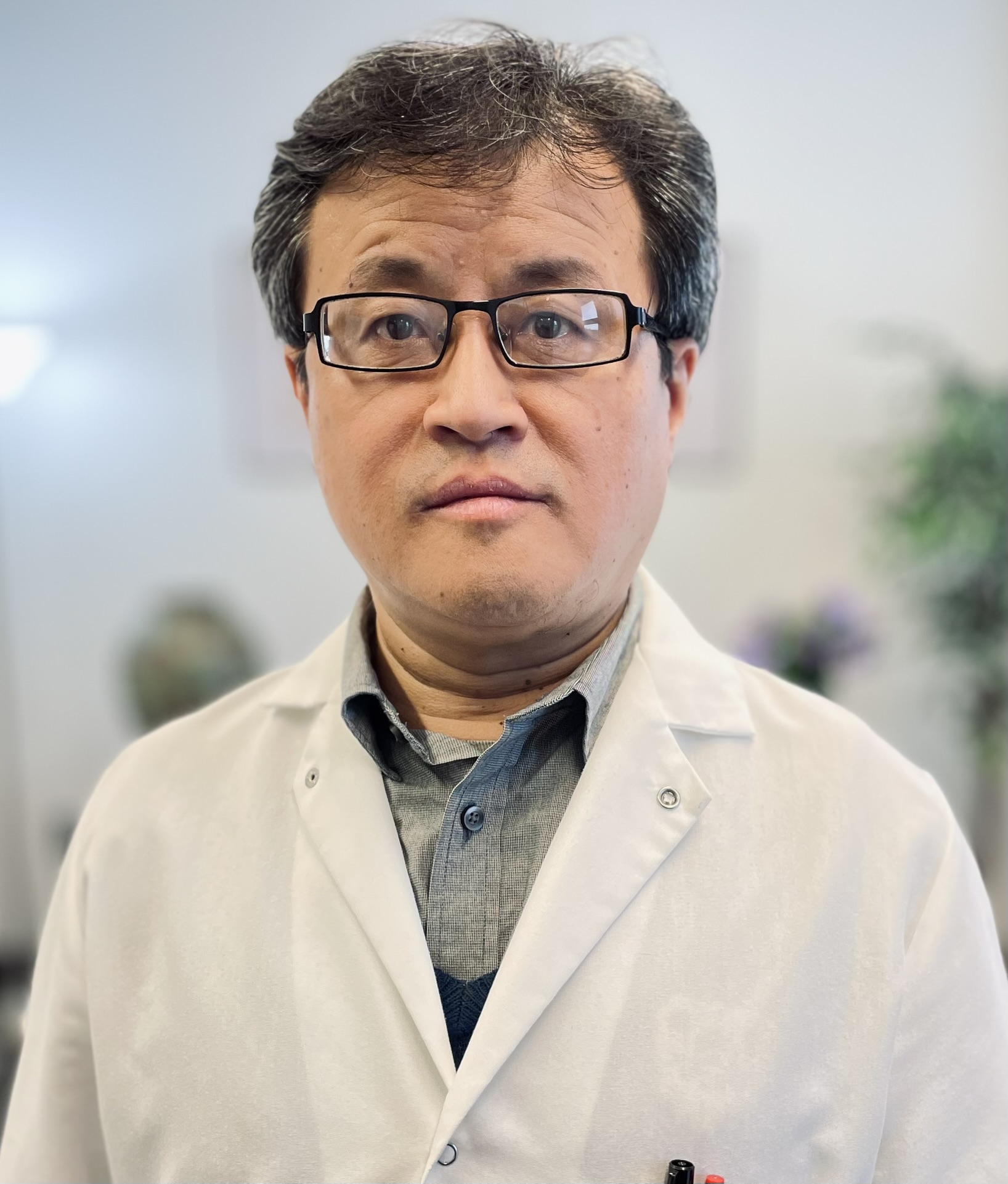
Yukai He Lab
 Yukai He, MD, PhD
Yukai He, MD, PhD
Professor
Department, Medicine
Department, Biochemistry And Molecular Biology
The Graduate School
Medical College Of Georgia
Research Summary
Contact Us
The Yukai He Lab
Health Sciences Campus
GCC - M. Bert Storey Research Building
1410 Laney Walker Blvd., CN-4144B1
(706) 721-2728
(Office)
Primary Areas of Interest
Cancer Diseases of Interest
Head and Neck Cancers
Research Methodologies
Human tumor xenografts
Flow cytometry
Other Areas of Interest
T cell immunity
T cell engineering
Current Research Projects/ Grants
“TCR engineering of human T cells for immunotherapy of hepatocellular carcinoma”. This project is funded by NCI grant R01 CA235159 from 12/07/18 to 11/30/2024. In this grant, we propose to identify novel HCC TCR genes and develop TCR-T immunotherapy for HCC. Liver cancer is the 5th most common cancer and the 3rd most common cause of cancer death in the world. According to CDC, the incidence rate of liver cancer has doubled over last 20 years, making it the fastest growing cancer in US, especially for minority groups like Hispanic and black Americans. It is estimated that there will 42,220 new cases and 30,200 death of liver cancer in 2018. Engineering patient’s autologous T cells with AFP (HCC tumor associated antigen)- specific T cell receptor (TCR) genes offers a specific immunotherapy approach for HCC. In this project, we plan to 1) identify hAFP-specific TCRs to create TCR-Ts of different functional avidity, 2) identify the hAFP-specific TCRs without or with minimal cross-reactivity, and 3) create expandable and removable TCR-Ts with stemness to achieve stronger in vivo antitumor effect. The goals are to obtain the optimal TCR genes that can engineer primary human T cells to become effective TCR-T cells capable of killing human HCC cells without harming normal cells and to establish protocol for generating safe and effective TCR-T cells that are ready for clinical trials. This will eventually lead to new therapeutic approach for HCC. In year 2020, the TCR developed from this study entered into clinical trial (NCT03971747).
The second project in my lab is to develop novel chimeric antigen receptors (CAR) and CAR engineered T cells (CAR-Ts) with moderate-affinity and optimal engaging kinetics for HCC and head and neck cancers (HNC). The efficacy of solid tumor CAR-Ts remains low despite intensive effort. Current CAR designs have been focusing on decreasing tonic signaling, enhancing CAR-T infiltration, improving TME, and reducing toxicity and immune escape. Nevertheless, such efforts result in only incremental improvement. Most CARs are built with high-affinity antigen-binding domains (ABD), majority of which is monoclonal antibody, mAb. However, T cell activation may not need high-affinity engagement. For example, the affinity of T cell reporter (TCR) for MHC/peptide complex is 3 logs lower than mAb binding antigen. We have been working on T cell engineering with both TCR and CAR, which prompt us to interrogate the importance of ABD affinity in CAR-T’s function. We recently showed that low affinity CAR-Ts expanded more, underwent less activation-induced cell death/exhaustion (AICDE), persisted longer, and generated durable antitumor effects. We reason that the current CAR affinity is too high and the engaging time with tumor cells is too long, which are unnecessary, cause off-tumor toxicity, and drive CAR-Ts to AICDE, especially in solid tumors. We hypothesize that ABD with optimal affinity and engaging kinetics will enable CAR-Ts to effectively kill tumor cells without being driven into AICDE and allow CAR-Ts to avoid off-tumor toxicity. The goal is to develop safe and effective CAR-Ts for solid tumors of head/neck cancer (HNC) and hepatocellular carcinoma (HCC) by studying the affinity and engaging kinetics of CAR-Ts with tumor cells. Currently this project is funded by intramural Paceline Cancer Research Award. We are actively seeking NIH grants to fund this highly impactful research.
Selected Publications
Lu, X. Deng, S. Xu, J. Green, B. L. Zhang, H. Cui, G. Zhou, Y. Zhang, Y. Xu, H. Zhang, F. Mao, R. Zhong, S. Cramer, T. Evert, M. Calvisi, D. F. He, Y. Liu, C. Chen, X. Combination of AFP vaccine and immune checkpoint inhibitors slows hepatocellular carcinoma progression in preclinical models. JCI 2023 Apr 11;e163291. doi: 10.1172/JCI163291
Caraballo Galva LD, Jiang X, Hussein MS, Zhang H, Mao R, Brody P, Peng Y, He, A. R. Kehinde-Ige, M. Sadek, R. Qiu, X. Shi, H. He, Y. Novel low-avidity glypican-3 specific CARTs resist exhaustion and mediate durable antitumor effects against HCC. Hepatology 2022; 76:330-344.
Mao R, Kong W, He Y (2022). The affinity of antigen-binding domain on the antitumor efficacy of CAR T cells: Moderate is better. Front Immunol 13: 1032403. PMID: 36325345; (DOI: 10.3389/fimmu.2022.1032403).
Mao R, Hussein MS, and He Y. (2022). Chimeric antigen receptor engineered T cells and their application in the immunotherapy of solid tumours. Expert Reviews in Molecular Medicine, 24, E7. doi: 10.1017/erm.2021.32; PMID: 35086597.
Zhu W, Peng Y, Wang L, Hong Y, Jiang X, Li Q, Liu H, Huang L, Wu J, Celis E, Merchen T, Kruse E, He Y. Identification of α-fetoprotein-specific T cell receptors for hepatocellular carcinoma immunotherapy. Hepatology. 2018 Aug; 68(2):574-589. doi: 10.1002/hep.29844. Epub 2018 Jun 12.
Wu S, Zhu W, Peng Y, Wang L, Hong Y, Huang L, Dong D, Xie J, Merchen T, Kruse E, Guo ZS, Bartlett D, Fu N, He Y The Antitumor Effects of Vaccine-Activated CD8+ T Cells Associate with Weak TCR Signaling and Induction of Stem-Like Memory T Cells. Cancer Immunol Res. 2017, 5(10): 908-12.
Hong Y, Peng Y, Guo ZS, Guevara-Patino J, Pang J, Butterfield LH, Mivechi NF, Munn DH, Bartlett DL, He Y. Epitope-optimized alpha-fetoprotein genetic vaccines prevent carcinogen-induced murine autochthonous hepatocellular carcinoma. Hepatology. 2014 Apr; 59(4):1448-58.
Guo ZS, Lu B, Guo Z, Giehl E, Feist M, Dai E, Liu W, Storkus WJ, He Y, Liu Z, Bartlett DL. Vaccinia virus-mediated cancer immunotherapy: cancer vaccines and oncolytics. J Immunother Cancer. 2019 Jan 9; 7(1):6.
Research Team
